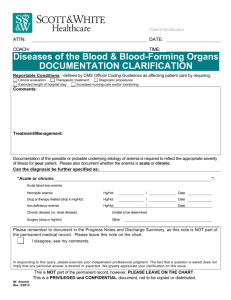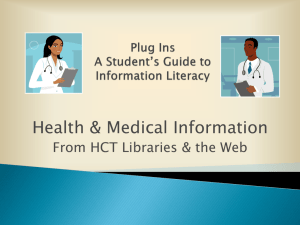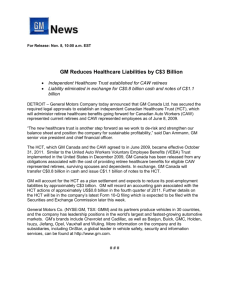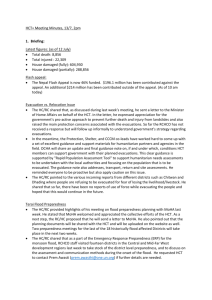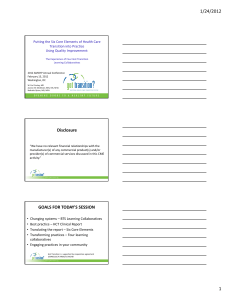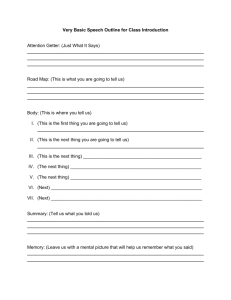SOA at Intermountain Healthcare: New IDEAs and Progress Towards a New Platform
advertisement
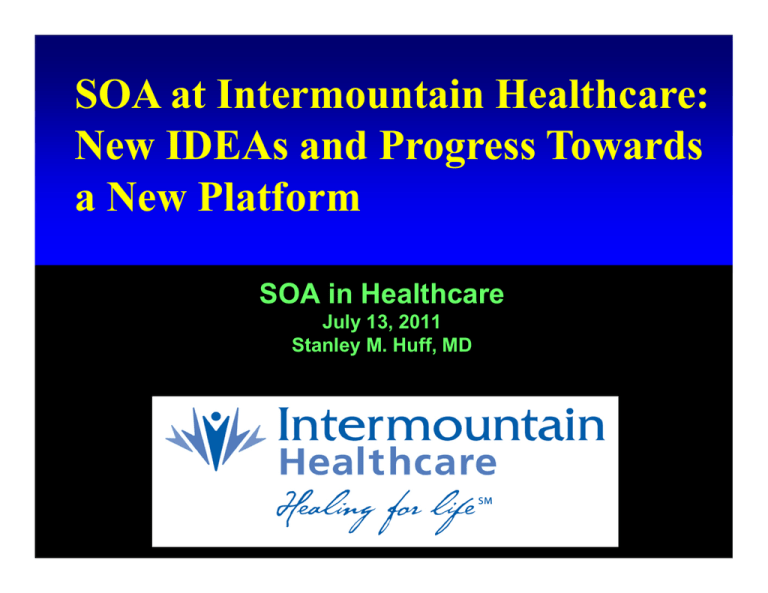
SOA at Intermountain Healthcare:
New IDEAs and Progress Towards
a New Platform
SOA in Healthcare
July 13, 2011
Stanley M. Huff, MD
Huff # 1
Acknowledgements
•
•
•
•
•
•
•
•
•
Tom Oniki
Joey Coyle
Craig Parker
Yan Heras
Cessily Johnson
Roberto Rocha
Lee Min Lau
Alan James
Many, many, others…
#2
Intermountain Medical Center
Women’s
and
Newborn
Main Tower
Heart and Lung
Hospital
Cancer
Center
Outpatient
Pavilion
Intermountain Healthcare
•
•
•
•
•
•
•
•
•
24 hospitals
2,488 inpatient beds
123,447 Acute admissions
98,674 Ambulatory
surgeries
160,306 Homecare visits
502,327 Acute patient
days
5,817,392 Outpatient
visits
429,949 emergency room
visits
38,103 inpatient surgeries
Homer Warner and HELP
• The first version of the
HELP (Health Evaluation
through Logical
Processing) system was
built in 1967
• From its inception, the
HELP system was built
primarily to provide
advanced decision support
Dr. Homer Warner
Patient
Core Assumptions
‘The complexity of modern medicine exceeds the
inherent limitations of the unaided human
mind.’
~ David M. Eddy, MD, Ph.D.
‘... man is not perfectible. There are limits to
man’s capabilities as an information processor
that assure the occurrence of random errors in
his activities.’
~ Clement J. McDonald, MD
Clinical System Approach
Intermountain can only provide
the highest quality, lowest cost
health care with the use of
advanced clinical decision
support systems integrated into
frontline workflow
Total # moderate + severe ADEs
Adverse Drug Events
600
581
567
569
600
567
500
500
477
437
400
400
355
300
271
280
271
300
233
200
• Rates today (2008-9) at about 230 per year
200
100
• Generates >$1 million per year in net cost reductions
at LDS Hospital alone
100
0
0
89
90
91
92
93
94
Year
95
96
97
98
99(3)
Neo-natal intensive care unit (NICU)
admits by weeks gestation
Deliveries w/o Complications, 2002 - 2003
10
Percent NICU admissions
n=
10
8,001
18,988
33,185
19,601
4,505
258
8
8
6.66
6
6
4.26
4
4
3.44
3.36
2.47
2.65
2
2
0
0
37
38
39
40
Weeks gestation
41
42
Elective inductions < 39 weeks
30
30
29 29.2
27.6
25
25
25.3
20
20
20.4
19.1
16.5
15
15
15.2
10.7
10
10
8.2
8.4
8.1
6.8
5.5
6.3
5.9 6.1 6
5
6.6 6.3
6
5.1
7.9
6.6 6.6
7.6 7.6
6.4
5.4 5.7
5.3
4.6
5.1
4.5
5
5
3.5
423
473
372
415
435
455
382
337
366
453
476
382
490
430
422
430
356
372
455
n=
475
557
564
578
573
505
474
562
535
512
602
667
637
541
533
501
536
545
500
l
Ju
Se
p
N
ov
Ja
n
04
M
ar
M
ay
l
Ju
03
M
ar
M
ay
Ja
n
l
Ju
Se
p
N
ov
Ja
n
02
M
ar
M
ay
l
Ju
M
ay
n
M
ar
0
01
0
Ja
% elective inductions < 39 weeks
26.726.9
2000
2000
1800
1800
1600
1600
1400
1400
1200
1200
Expected maternal and fetal combined variable cost
Goal: hold increase to no more than 6.85%
Actual combined variable cost
ay
M
pr
A
M
ar
Fe
b
20
04
D
ec
Ja
n
N
ov
O
ct
Se
p
A
ug
Ju
l
Ju
n
ay
M
pr
A
M
ar
Fe
b
1000
20
03
1000
Ja
n
Average combined variable cost ($)
Labor & delivery variable cost
ARDS … evidence in action
Defining the best practice clinical protocol
Physician compliance
ARDS ventilator management:
• Survival 9.5% 44%
• ~$120,000 less cost per case!
Decision Support Modules
•
•
•
•
Antibiotic Assistant
Ventilator weaning
ARDS protocols
Nosocomial infection
monitoring
• MRSA monitoring and
control
• Prevention of Deep
Venous Thrombosis
• Infectious disease
reporting to public health
•
•
•
•
•
•
•
•
•
•
Diabetic care
Pre-op antibiotics
ICU glucose protocols
Ventilator disconnect
Infusion pump errors
Lab alerts
Blood ordering
Order sets
Patient worksheets
Post MI discharge meds
Infrastructure Vision
•
•
•
•
•
Rapid application development environment
Dynamic workflow configuration
Standard data models and terminology
Decision support authoring and execution
Knowledge asset management
– Rules, alerts, protocols, reminders, reports
• End user preferences
– Common lists, Hot text
• Service Oriented Architecture/Enterprise Service
Bus
Huff # 15
Strategic Goals
• Minimum goal: Be able to share
applications, reports, alerts, protocols, and
decision support with ALL GE customers
• Maximum goal: Be able to share applications,
reports, alerts, protocols, and decision support
with anyone in the WORLD
Order Entry API (adapted from Harold Solbrig)
Application
Interface
Service
Data
VA Order
Entry
Update Medication Order
COS
VA
Order
Services
Update PharmacyOrder
WHERE orderNumber = “4674” …
MUMPS
Database
Order Entry API – Different Client,
Same Service (adapted from Harold Solbrig)
Application
Interface
Service
Data
Dept
of
Defense
Update Medication Order
COS
VA
Order
Services
Update PharmacyOrder
WHERE orderNumber = “4674” …
MUMPS
Database
Order Entry API – Different Server,
Same Client (adapted from Harold Solbrig)
Application
Interface
Dept
of
Defense
Update Medication Order
COS
GE
Services
Update PharmacyOrder
WHERE orderNumber = “4674” …
Service
Data
GE
Repository
Oracle
Tables
Order Entry API (adapted from Harold Solbrig)
...
Application
Interface
Service
Data
COS
What Is Needed to Create a New Paradigm?
• Standard set of detailed clinical data
models coupled with…
• Standard coded terminology
• Standard API’s (Application Programmer
Interfaces) for healthcare related services
• Open sharing of models, coded terms, and
API’s
What are detailed clinical
models?
Why do we need them?
# 22
A diagram of a simple clinical model
Clinical Element Model for Systolic Blood Pressure
SystolicBP
SystolicBPObs
data
138 mmHg
quals
BodyLocation
BodyLocation
data
Right Arm
PatientPosition
PatientPosition
data
Sitting
# 23
Need for a standard model
•A stack of coded items is ambiguous (SNOMED CT)
– Numbness of right arm and left leg
•
•
•
•
•
Numbness (44077006)
Right (24028007)
Arm (40983000)
Left (7771000)
Leg (30021000)
– Numbness of left arm and right leg
•
•
•
•
•
Numbness (44077006)
Left (7771000)
Arm (40983000)
Right (24028007)
Leg (30021000)
# 24
What if there is no model?
Site #1
37
Hct, manual: 70
%
35
: 70
%
37
: 70
%
Hct, auto
Site #2
Hct
Manual
Auto
Estimated
# 25
HL7 V2.X Messages
• Site 1:
OBX|1|CE|4545-0^Hct, manual||37||%|
OBX|1|CE|4544-3^Hct, auto||35||%|
• Site 2:
OBX|1|CE|20570-8^Hct||37||%|….|manual|
OBX|1|CE|20570-8^Hct||35||%|….|auto|
Model fragment in XML
Pre-coordinated representation
<observation>
<cd> Hct, manual (LOINC 4545-0 ) </cd>
<value> 37 % </value>
</observation>
Post-coordinated (compositional) representation
<observation>
<cd> Hct (LOINC 20570-8) </cd>
<qualifier>
<cd> Method </cd>
<value> Manual </value>
<qualifier>
<value> 37 % </value>
</observation>
# 27
Relational database implications
Patient
Identifier
Date and Time
Observation Type
Observation
Value
Units
123456789
7/4/2005
Hct, manual
37
%
123456789
7/19/2005
Hct, auto
35
%
Patient
Identifier
Date and Time
Observation
Type
Weight type
Observation
Value
Units
123456789
7/4/2005
Hct
manual
37
%
123456789
7/19/2005
Hct
auto
35
%
If the patient’s hematocrit is <= 35 then ….
# 28
Isosemantic Models
Precoordinated Model
HematocritManual (LOINC 4545-0)
HematocritManualModel
data
37 %
Post coordinated Model (Storage Model)
Hematocrit (LOINC 20570-8)
HematocritModel
data
37 %
quals
HematocritMethodModel
data
Hematocrit Method
Manual
# 29
More complicated items:
•
•
•
•
•
•
•
Signs, symptoms
Diagnoses
Problem list
Family History
Use of negation – “No Family Hx of Cancer”
Description of a heart murmur
Description of breath sounds
– “Rales in right and left upper lobes”
– “Rales, rhonchi, and egophony in right lower lobe”
# 30
What do we model?
• All data in the patient’s EMR, including:
–
–
–
–
–
–
–
–
–
–
Allergies
Problem lists
Laboratory results
Medication and diagnostic orders
Medication administration
Physical exam and clinical measurements
Signs, symptoms, diagnoses
Clinical documents
Procedures
Family history, medical history and review of symptoms
Model Subtypes Created
• Number of models created - 4384
– Laboratory models – 2933
– Evaluations – 210
– Measurements – 353
– Assertions – 143
– Procedures – 87
– Qualifiers, Modifiers, and Components
• Statuses – 26
• Date/times – 27
• Others – 400+
# 32
How are the models used?
• Data entry screens, flow sheets, reports, ad hoc
queries
– Basis for application access to clinical data
• Computer-to-Computer Interfaces
– Creation of maps from departmental/foreign system models
to the standard database model
• Core data storage services
– Validation of data as it is stored in the database
• Decision logic
– Basis for referencing data in decision support logic
• Does NOT dictate physical storage strategy
Model Source Expression (CDL)
model BloodPressurePanel is panel
{
key code(BloodPressurePanel_KEY_ECID);
statement SystolicBloodPressureMeas systolicBloodPressureMeas optional
systolicBloodPressureMeas.methodDevice.conduct(methodDevice)
systolicBloodPressureMeas.bodyLocationPrecoord.conduct(bodyLocationPrecoord)
systolicBloodPressureMeas.bodyPosition.conduct(bodyPosition)
systolicBloodPressureMeas.relativeTemporalContext.conduct(relativeTemporalContext)
systolicBloodPressureMeas.subject.conduct(subject)
systolicBloodPressureMeas.observed.conduct(observed)
systolicBloodPressureMeas.reportedReceived.conduct(reportedReceived)
systolicBloodPressureMeas.verified.conduct(verified);
statement DiastolicBloodPressureMeas diastolicBloodPressureMeas optional
….
statement MeanArterialPressureMeas meanArterialPressureMeas optional
….
qualifier MethodDevice
methodDevice
optional;
md.code.domain(BloodPressureMeasurementDevice_DOMAIN_ECID);
qualifier BodyLocationPrecoord
bodyLocationPrecoord
optional;
blp.code.domain(BloodPressureBodyLocationPrecoord_DOMAIN_ECID);
modifier Subject
subject
optional;
attribution Observed
observed
optional;
attribution ReportedReceived
reportedReceived
optional;
attribution Verified
verified
optional;
}
# 34
So that is the vision of
the future, what is
happening right now?
Huff # 35
HELP
Care Flow
(Inpatient HIS)
(Outpatient)
3M
Misys Lab
GEHC
GE/AGFA Radiology
Tamtron Anatomic Pathology
McKesson Pharmacy
HELP
Database
ARUP Blood Bank
Blood Gas Machines
Dictaphone
Varis Oncology
MRS Mammography
ADT, Orders,
Results, Billing
ADT,
Orders,
Results,
Billing
Registration,
Scheduling
eGate
Interface
Engine Sun
GE/Logicare ER
Clinical
Workstation
HELP2
CD
IHC
Health Data
Dictionary
3M
ADT, Billing,
Case Mix
Billing &
Financial
ADT, Results,
Orders
Registration,
Scheduling
Computrition Dietary
3M
ADT,
Billing
HDM &
Medrec
3M
IHC
DataStage
Tuxedo
CDR
Database
(HEMS) 3M
Data
Warehouse
IHC
Application Explosion
• 4000+ applications in the organization
• Applications being purchased or built include
approximately 80% redundancy of functionality
Data Explosion
• All new applications require duplication of data
• One example of data duplication
–
–
–
–
49 copies of patient registration data
294 million patient records online
288 million or 97% are duplicate copies
125,000 registration updates/day or 6.1 million total data updates
daily
Information Delivery Enterprise
Architecture
IDEA Governance Structure
RESPONSIBILITES
EARB
•Provides strategic oversight and
guidance for IDEA
•Empowers IDEA subcommittee to
specifying standards, practices,
guidelines and tools
•Approval of IDEA subcommittee
proposals
•Monitors and is accountable for
adherence to approved standards,
practices, guidelines and tools
Chair: Chief Technology Officer
IDEA
GOVERNANCE
IDEA Subcommittee
Chair: Enterprise Software Architect
MEMBERS
PMO, HELP1, HELP2, Migration,
Financial, Tactical, eBusiness,
Clinical Operations, Interfaces,
EDW, ECIS, Informatics, Security,
Select Health, Operations, RIM,
KTMI, HWCIR
Fostering
Excellence
Workgroup
Exception
Handling
Workgroup
Auditing
Workgroup
Security
Architecture
Subcommittee
Desktop
Subcommittee
Database
Architecture
Subcommittee
RESPONSIBILITES
•Establish the Information Delivery Enterprise
Architecture by specifying standards, practices,
and guidelines and tools
•Build consensus and document software
standards, processes, tools, and infrastructure to
be approved by IDEA Governance
•Provides stewardship for respective teams
•Brings forth gaps, issues and solutions for
IDEA
A Picture
Something More Concise
New 3rd Party
Application
Intermountain
Application
IDEA Enterprise Service Bus
Intermountain
Central Data Rep
New 3rd Party
Data Repository
Nursing ‘Medication Charting’
workflow
Physician “Note Writing” workflow
Clinician ‘Data Review’ workflow
Potential Benefits
• Low risk
• Incremental changes - no “big bang”
changes
• Gradual implementation of ESB
• Transition based on particular modules
– Results review, text documents, allergies,
documentation, order entry
• Slowly increasing use of the new database
– Opportunity to tune performance
Huff # 45
Questions?
Huff # 46
